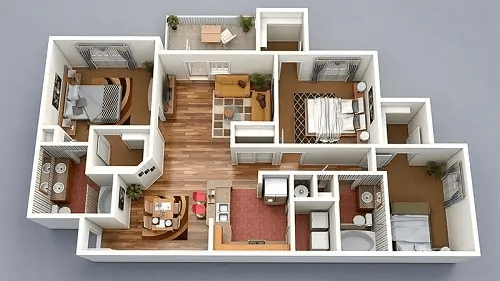The Cost-Saving Strategies for Home Construction
Absolutely, saving costs during home construction is a smart move. Here are some strategies that can help you cut down expenses:

Plan and Design: Having a well-thought-out plan is crucial. Changes during construction can be costly, so ensure your design is final before starting.
Budgeting: Set a clear budget and stick to it. Allow some buffer for unexpected expenses.
Material Selection: Opt for cost-effective materials without compromising quality. Look for wholesale deals, recycled materials, or alternatives that are durable and affordable.
Comparison Shopping: Research and compare prices from different suppliers for materials and services. Sometimes, negotiating bulk prices can result in significant savings.
DIY (Do It Yourself): Undertake tasks you're capable of doing yourself, such as painting, landscaping, or simple installations. But remember, some tasks might require professional expertise.
Energy Efficiency: Invest in energy-efficient appliances, insulation, and windows. While this might have an initial cost, it can save money in the long run through reduced utility bills.
Sustainable Choices: Consider eco-friendly options like solar panels, rainwater harvesting systems, or using reclaimed materials. Some of these choices might offer tax incentives or long-term savings.
Right Contractor: Obtain multiple quotes from contractors and choose one with a good track record and reasonable pricing. Make sure the contract is clear about costs and timelines.
Avoid Changes During Construction: Changes mid-project can be expensive due to added labor and material costs. Stick to the agreed plan as much as possible.
Timing: Start construction during the off-season if possible. Contractors might offer discounts during less busy periods.
Standard Sizes: Design rooms and spaces using standard dimensions to minimize waste and extra costs for customization.
Phased Construction: If feasible, break the construction into phases. This allows you to spread out costs and manage finances more effectively.
Permits and Regulations: Ensure you have all the necessary permits and comply with local regulations to avoid fines or unexpected costs.
Regular Inspections: Conduct regular inspections to catch any errors or issues early on. Fixing problems early is usually cheaper than later.
Financial Planning: Consider financing options carefully. Look for low-interest loans or explore grants available for certain types of construction or renovations.

Remember, while cost-cutting is essential, ensure you're not compromising on safety or the structural integrity of your home. Always consult professionals when needed to avoid potential problems down the line.
